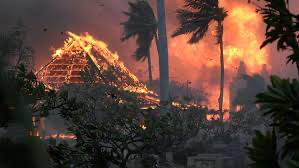When Hawaii officials released a report last year ranking the natural disasters most likely to threaten state residents, tsunamis, earthquakes and volcanic hazards featured prominently. Near the bottom of a color-coded chart, the state emergency management agency described the risk of wildfires to human life with a single word: “low.”
A year and a half later, the catastrophic fires that engulfed Maui and the historic town of Lahaina this week have already become the state’s deadliest natural disaster in more than six decades, with a fatality count of at least 93.
Hawaii officials underestimated the deadly threat of wildfires even as they acknowledged a lack of necessary resources to mitigate them, according to a CNN review of state and local emergency planning documents that show how ill-prepared the state was for the disaster.
One Maui County report on wildfire prevention from 2021 stated that while the number of acres consumed by wildfires had spiked, funds to prevent and mitigate them were “inadequate.” The report also stated that the county fire department’s strategic plan included “nothing about what can and should be done to prevent fires” – in what it called a “significant oversight.”
The report recommended a thorough risk assessment of fire hazards, but it’s not clear whether officials heeded the recommendation.
Other reports over the past five years show authorities knew the risk of fires was increasing and could be exacerbated by hurricane-force winds – like the Lahaina blaze was. “Fires occurring as a result of and concurrent with another major threat or disaster, such as a hurricane, are particularly challenging,” one report stated, with first responders and firefighters stretched to capacity. During this week’s fires, Hurricane Dora was hundreds of miles south of Maui, but the storm’s winds still fanned flames on the island.
The state emergency management agency’s public resources webpage also lays out clear, bullet-point recommendations of what residents should do in the event of a hurricane, tsunami, flash flood or earthquake. At the bottom of the page, the agency includes two short paragraphs about wildfires – with no similar advice on ways to stay safe.
Hawaii and Maui County officials didn’t immediately respond to requests for comment Friday as disaster response efforts continued.
While fires were historically sparked by volcanic eruptions and lightning strikes, the area burned in the state each year has dramatically increased over recent decades, according to a 2014 report by University of Hawaii researcher Clay Trauernicht.
In August 2018, brush fires broke out as Hurricane Lane neared Maui. The fires engulfed more than 2,000 acres and forced dozens to flee their homes. The storm should have been considered a “real-world wakeup” call for Hawaii, according to a 2019 plan from the Hawaii Emergency Management Agency.
Large fires also whipped through Maui in 2019, burning roughly 25,000 acres of former sugarcane land and dry brush as Hawaii endured record high temperatures.
The increase in fires comes as Maui has faced worsening drought conditions in recent years, according to federal data. Also, people have introduced new grass species and shrubs to the island that act as kindling in dry conditions.
“There are vast expanses of these non-native grasslands in Hawaii, and they are extremely flammable,” said Abby Frazier, a climatologist at Clark University in Massachusetts, who has researched Hawaii. “Especially when you have severe drought conditions like we have.”
Despite these growing dangers, Hawaii state budgets for fire management have not kept pace with worsening conditions, according to the Hawaii Wildfire Management Organization, a nonprofit.
“Hawaii has a big wildfire problem. We are on par with the most fire-prone states in the western continental US,” Nani Barretto, an executive director for the group, said during a webinar in May. “The impacts of fire are broad and long-lasting … There is a lot we can do to prevent them.”
The 2021 Maui County report also recommended an “aggressive plan to replace” flammable nonnative grass species, but it’s unclear whether local officials took action to do so.
Hawaii is hardly unique: As climate change is exacerbating natural disasters, state officials across the country are also struggling to respond to new threats. And it’s unclear how significantly additional preparedness and mitigation efforts could have reduced the destruction of a blaze with the intensity and speed of the Lahaina wildfire.
“When we are preparing for the hurricane, we expect rain, sometimes we expect floods,” Hawaii Lt. Gov. Sylvia Luke said at a press conference Wednesday. “We never anticipated that in this state that a hurricane which did not make impact on our islands would cause this type of wildfires.”
Josh Stanbro, Honolulu’s former chief resilience officer, told CNN that the “double whammy” of hurricanes and wildfires creates events that “are outside of the normal paradigm, especially for emergency responders.”
“This didn’t happen historically,” he said, noting that Lahaina stood for two centuries before the fires swept through it.
Maui’s geography, with towns hugging the coast surrounded by sparsely populated mountains and grasslands, also increases the risk from fires. In a foreshadowing of the difficulty residents faced evacuating from Lahaina, the Maui County report noted that “island communities are particularly vulnerable” to wildfires “because populations tend to be clustered and dependent on single highways, often located on the island edge.”
Gov. Josh Green said Thursday that the state would need to do more to prevent a similar disaster in the future.
“As we rebuild, we’ll have to take into consideration a lot more fire safety,” he said during a press conference.
Frazier, the climatology professor, said that the scale of the destruction in Lahaina is a lesson that “a lot of places in Hawaii are extremely vulnerable to wildfire, and that we do need to take fire prevention much more seriously.”
“It’s going to be a really long time, I think, before people forget this,” she said.









